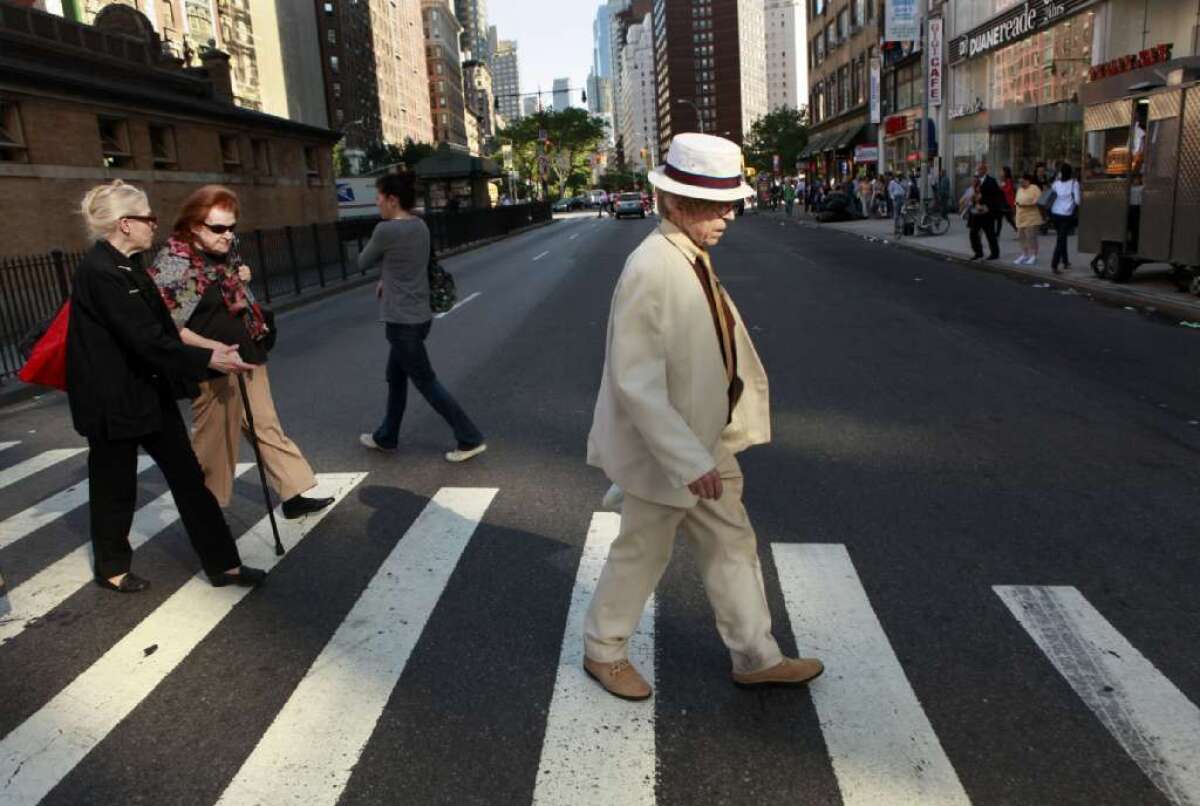Karma bites back: Hating on the elderly may put you at risk of Alzheimer’s

Making negative assumptions? A new study suggests the stress of bearing negative stereotypes about aging does the aging brain no favors.
- Share via
Next time you’re stuck behind a slow-moving older person and find yourself entertaining negative stereotypes about aging, consider this: A new study finds that people who were inclined to believe that older people were slower, unhappier and less sharp than the rest of us are more likely -- when, decades later, they become older themselves -- to exhibit the brain changes seen in those with Alzheimer’s disease.
That should teach you to respect your elders.
The latest findings are no mere fluke, either. They add to a welter of research that has found that holding negative views about aging puts one at greater risk of developing cardiovascular disease, of swifter cognitive decline -- including memory problems -- later in life.
The authors of the latest research -- led by Susan M. Resnick, the National Institutes of Health’s chief scientist on brain aging -- attribute the long-term effects of negative attitudes toward aging to stress. Live long enough in the belief that older people are afflicted with physical, cognitive financial and even sexual woes, and the stress of believing you are marching toward the same end will takes its toll.
In the new study, published in the journal Psychology & Aging, Resnick and researchers from Yale, Johns Hopkins and the National Institute on Aging tapped into the Baltimore Longitudinal Study of Aging, whose participants started getting yearly brain scans beginning, on average, at age 69. All were physically and cognitively healthy when they were recruited to the study and completed an exhaustive survey plumbing their attitudes toward aging.
The researchers looked at participants’ aging brains two ways: They inspected changes in 52 subjects’ brains as shown in magnetic resonance imaging scans taken over 10 years. And they performed post-mortem studies of the brains of 74 participants whose deaths came, on average, 20 years after they had filled out their attitudinal surveys on aging.
By both measures, the brains of those who held negative views of aging looked strikingly different than did the brains of those whose views of aging were more positive. MRI scans showed that those who held the most negative stereotypes of aging, on average, experienced dramatically greater shrinkage of the hippocampus--the structure deep in the brain that is central to memory-- than did those who held the most positive views of aging.
Volume loss in the hippocampus is a key physical sign of Alzheimer’s disease and other dementias.
The post-mortem studies showed that the brains of those whose attitudes toward aging had been most negative had significantly more amyloid plaques and neurofibrillary tangles -- both hallmarks of Alzheimer’s disease -- scattered in key regions throughout their brains than did those with more positive views.
Both observations held even after researchers took account of age, sex and a range of factors that can affect brain health. And the fact that the observations held for two different means of measuring brain structure -- over time and after death -- clearly suggests that attitudes about aging influence brain structure, and not that people with as-yet-undiagnosed Alzheimer’s are simply more negative about aging.
The study, says its authors, is the first to suggest that a “culture-based risk factor predicts the development” of brain changes that are clearly linked to Alzheimer’s disease. Long before the insidious changes of dementia gain a foothold in the brain, we might seek to prevent cognitive decline by adjusting our attitudes.
Healthy aging? Follow me! Oh, and follow me on Twitter @LATMelissaHealy and “like” Los Angeles Times Science & Health on Facebook.







